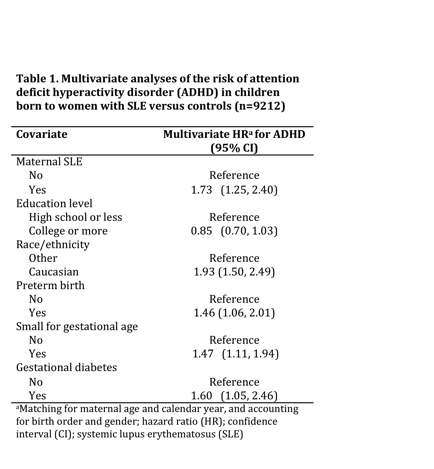Session Information
Title: Systemic Lupus Erythematosus - Clinical Aspects I - Renal, Malignancy, Cardiovascular Disease
Session Type: Abstract Submissions (ACR)
Background/Purpose: Women with SLE display autoantibodies (e.g. anti-N-methyl-D-aspartate receptor antibodies) and cytokines (e.g. interleukin-6), which, in animal models, alter fetal brain development and induce behavioural anomalies in offspring. To date, no one has specifically assessed the risk of attention deficit hyperactivity disorder (ADHD) in children of SLE mothers. Using the “Offspring of Systemic Lupus Erythematosus mothers Registry (OSLER)”, we aimed to determine if children born to SLE mothers have an increased risk of ADHD compared to children born to mothers without SLE.
Methods: OSLER is a large population-based cohort, which includes all women who had ³1 hospitalization for delivery after SLE diagnosis, identified through Quebec’s universal healthcare databases (1989-2009). OSLER also includes a randomly selected control group of women, matched at least 4:1 for age and year of delivery, who did not have a diagnosis of SLE prior to or at the time of delivery. We identified children born live to SLE mothers and their matched controls, and ascertained ADHD based on ³1 hospitalization or physician visit with a relevant diagnostic code, through to end of database follow-up.
We performed multivariate analyses to adjust for maternal demographics, sex and birth order of child, and obstetrical complications. In a subsample analysis of children with maternal public drug coverage throughout pregnancy, we further adjusted for relevant maternal medications.
Results: 509 women with SLE had 719 children, while 5824 matched controls had 8493 children. Mean maternal age and follow-up were respectively 30.3 [standard deviation (SD) 5.0] and 9.1 (SD 5.8) years. Children born to women with SLE had more records of ADHD diagnoses [9.9% (95% CI 7.9, 12.3) vs 6.1% (95% CI 5.6, 6.6)]. Mean age at ADHD diagnosis was older in offspring of SLE mothers (12.5 years, 95% CI 11.7, 13.3) as opposed to controls (7.8 years, 95% CI 7.5, 8.1).
In multivariate analysis (Table 1), children born to women with SLE had substantially increased risk of ADHD (HR 1.73, 95% CI 1.25, 2.40) versus controls. Interestingly, in the subsample analysis further adjusting for in utero drug exposures (n=1925), there was no longer a clear association of SLE with an increased risk of ADHD (HR 0.97, 95% CI 0.41, 2.28). However, in utero exposure to antidepressants appeared to be associated with a substantially increased risk of ADHD (HR 3.70, 95% CI 1.38, 9.94).
Conclusion: Compared to children from the general population, children born to women with SLE appear to have an increased risk of ADHD. Our evidence suggests that the excess risk of ADHD in SLE offspring might be mediated by in utero drug exposures.
Disclosure:
E. Vinet,
None;
S. Scott,
None;
C. A. Pineau,
None;
L. Joseph,
None;
A. E. Clarke,
None;
E. Fombonne,
None;
R. W. Platt,
None;
S. Bernatsky,
None.
« Back to 2013 ACR/ARHP Annual Meeting
ACR Meeting Abstracts - https://acrabstracts.org/abstract/is-an-excess-risk-of-attention-deficit-hyperactivity-disorder-in-children-born-to-women-with-sle-mediated-by-in-utero-drug-exposures-preliminary-data-from-the-o-s-l-e-r-cohort/

